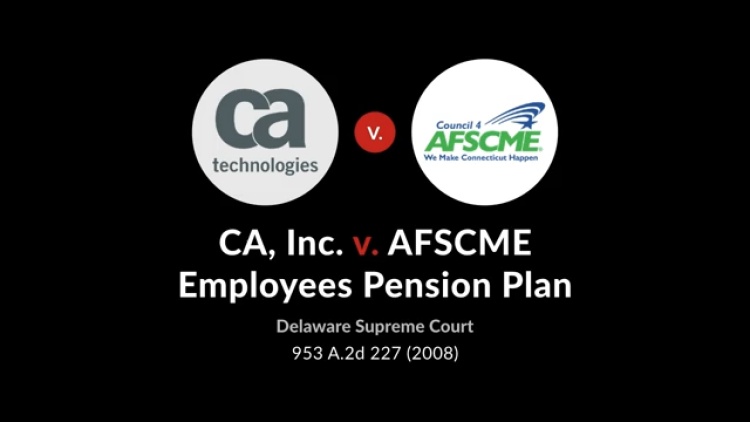CA, Inc. v. AFSCME Employees Pension Plan
Delaware Supreme Court
953 A.2d 227 (2008)
- Written by Angela Patrick, JD
Facts
CA, Inc. (plaintiff) was a Delaware corporation that elected its entire board of directors each year. AFSCME Employees Pension Plan (AFSCME) (defendant) was a CA shareholder. AFSCME proposed a new bylaw under which CA’s directors would be required to use corporate funds to reimburse shareholders for the costs associated with nominating candidates in contested director elections. Without the bylaw, the board of directors had sole discretion over whether to reimburse shareholders for the costs of participating in the board’s election process, subject to the directors’ fiduciary duties and Delaware law. CA notified the Securities and Exchange Commission (SEC) of its intent to exclude AFSCME’s proposal from CA’s upcoming shareholder vote. CA requested a no-action letter stating that the SEC would not take any enforcement action if CA excluded the proposal. CA’s request was accompanied by an attorney-opinion letter claiming AFSCME’s proposal was not a permissible subject for a shareholder-proposed bylaw and violated Delaware law. CA argued that a shareholder could not use a bylaw to limit the board’s authority to decide how to spend corporate funds on a specific issue. AFSCME opposed the request with its own attorney-opinion letter arguing the proposed bylaw was a permissible shareholder proposal and legal. To obtain guidance, the SEC certified two questions to the Delaware Supreme Court about whether the bylaw was (1) a permissible subject for shareholders to propose and (2) otherwise lawful.
Rule of Law
Issue
Holding and Reasoning (Jacobs, J.)
What to do next…
Here's why 907,000 law students have relied on our case briefs:
- Written by law professors and practitioners, not other law students. 47,100 briefs, keyed to 996 casebooks. Top-notch customer support.
- The right amount of information, includes the facts, issues, rule of law, holding and reasoning, and any concurrences and dissents.
- Access in your classes, works on your mobile and tablet. Massive library of related video lessons and high quality multiple-choice questions.
- Easy to use, uniform format for every case brief. Written in plain English, not in legalese. Our briefs summarize and simplify; they don’t just repeat the court’s language.





